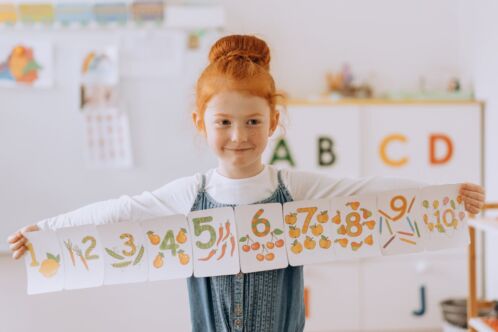There’s more to the relationship between music and math than meets the eye—or the ear, for that matter! Dubbed the “Mozart Effect,” studies like this one in the Journal of Aesthetic Education suggest that music instruction improves test scores for kids, especially in math and science.
Formal lessons are great for older children, but can you introduce musical math to younger kids? Here’s an idea to help you get started:
Setting Up
A scale is made up of seven notes. Most people are familiar with scales from the song: Do-Re-Mi-Fa-Si-La-Do! Sing it out and each is a note in the scale. The most basic scale, the C Major scale, goes C-D-E-F-G-A-B-high C. On a piano, you can count it out by the white keys. It looks like this:
For our purposes, you’ll want to mark and number each note between the C’s—one through seven—with sticker dots or a dry-erase marker. And that’s it! Sing it out again, but instead of Do-Re-Mi it’s now 1-2-3. Presto, a musical abacus to help create your own math games. You can add this to your arsenal for creative ways to keep kids engaged during the summer months, too.
How to Play
Start with an addition game. The sound of each note can be used as a clue to which numbers are being added. So, hit the C key (numbered 1) and then E (numbered 3), then ask your little one for the sum. Here, you can give them a hint by hitting the F key for 4 or hum/sing the note as a clue. Now, you’ve not only got them doing math, but you’re teaching them to recognize music notes. You can add rhythm, too!
Don’t have a piano or a musical bone in your body? Pots and pans of different sizes make great drums. Line them up from lowest PLUNK to highest DING and number each one.
Next, you can come up with your own ways to play. Add some teamwork and healthy competition into the mix by inviting other kids to join in on the math fun, and keep score.




